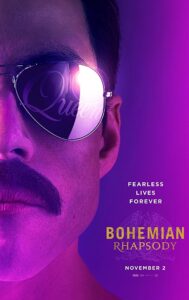The much maligned Freddie Mercury biopic is a heavily edited rock and roll history lesson, but it’s darned entertaining.

 Despite criticism that the script fails to capture the true story of legendary rock band Queen and its enigmatic frontman, few can deny that “Bohemian Rhapsody” is really a fun movie. Wearing its PG-13 rating proudly, this soft biopic is aimed directly at a younger generation that discovered the chart-topping music in high school chorus class.
Despite criticism that the script fails to capture the true story of legendary rock band Queen and its enigmatic frontman, few can deny that “Bohemian Rhapsody” is really a fun movie. Wearing its PG-13 rating proudly, this soft biopic is aimed directly at a younger generation that discovered the chart-topping music in high school chorus class.
Following the rise of one of the most popular bands in music, screenwriters Peter Morgan (“The Queen”) and Anthony McCarten (“The Theory of Everything”) serve up a script that hits the high points that defined rock. From their humble beginnings as Smile, we meet drummer Roger Taylor (Ben Hardy) and lead guitarist Brian May (Gwilym Lee) before they partner up with Farrokh Bulsara (Rami Malek), the singer who transforms into Freddie Mercury. The eclectic Bulsara approaches the duo after a concert in a pub and wows them with his vocal range, which may have something to do with the extra teeth in his mouth. Soon, the band changes their name to the edgy Queen, and Farrokh becomes Freddie.

After finding early success, the foursome, which then included John Deacon (Joseph Mazzello) on bass, decides to follow Mercury’s lead and take chances with their music. The idea is to develop a concept album influenced by opera. As if by magic, we see them compose the operatic rock anthem “Bohemian Rhapsody,” and we witness the fight to get the long and unusual song released. Their meteoric rise was not without troubles. And as the rest of the band find partners and start families, Freddie battles with his sexual identity. Caught in the middle is Mary Austin (Lucy Boynton), Freddie’s partner. They love one another, but they know that they can’t be together. And constant touring will always get in the way.

Likely to be recognized this awards season for Rami Malek’s uncanny performance as Mercury, “Bohemian Rhapsody” gives us a sanitized history of the super group as they rose to greatness. The film works mainly on the surface, with in jokes that include Mike Myers playing a music executive, who refuses to release their epic song. The irony is thick and very much on the nose, as Myers, who once rocked out to the tune in “Wayne’s World,” now plays the guy who let it all slip away. It’s very entertaining, but this upbeat material plays against the darkness that eventually consumed Mercury, who was only able to find peace at the very end of his life.

If there are moments of truth in “Bohemian Rhapsody,” they center on scenes in which Mercury composes. In one sequence, we see him writing a song and he trembles. He’s shaken by his own genius. Later, when the band takes the stage to perform at the enormous Live Aid concert, we get an exacting recreation. It’s really rocking, and a bit eerie, as Malek lip syncs perfectly. And in this respect, the movie is more of a concert film than a narrative based on a true story.
Ultimately, the music shines through, but it isn’t the story the die-hard fans want. The dirt is left under the fingernails.
